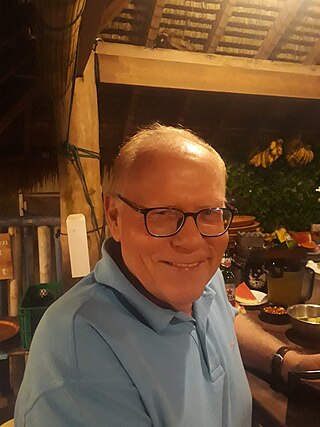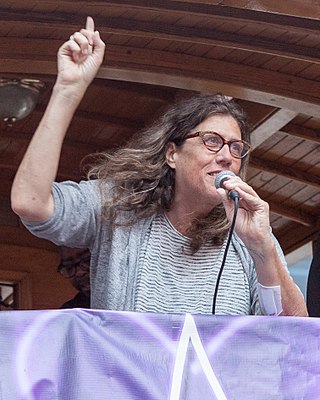
Queer is an umbrella term for people who are not heterosexual or are not cisgender. Originally meaning 'strange' or 'peculiar', queer came to be used pejoratively against LGBT people in the late 19th century. From the late 1980s, queer activists began to reclaim the word as a neutral or positive self-description.
Gay bashing is an attack, abuse, or assault committed against a person who is perceived by the aggressor to be gay, lesbian, bisexual, transgender or queer (LGBTQ+). It includes both violence against LGBT people and LGBT bullying. The term covers violence against and bullying of people who are LGBT, as well as non-LGBT people whom the attacker perceives to be LGBT.
Queer studies, sexual diversity studies, or LGBTQ studies is the study of topics relating to sexual orientation and gender identity usually focusing on lesbian, gay, bisexual, transgender, gender dysphoric, asexual, aromantic, queer, questioning, and intersex people and cultures.
Linguistic anthropology is the interdisciplinary study of how language influences social life. It is a branch of anthropology that originated from the endeavor to document endangered languages and has grown over the past century to encompass most aspects of language structure and use.
Takatāpui is a Māori language term that is used in a similar way to LGBT. When speaking Māori, LGBT people of any culture are referred to as takatāpui. In English, a takatāpui person is a Māori individual who is gay, lesbian, bisexual, or transgender (LGBT).

Gayle S. Rubin is an American cultural anthropologist, theorist and activist, best known for her pioneering work in feminist theory and queer studies.
Digital anthropology is the anthropological study of the relationship between humans and digital-era technology. The field is new, and thus has a variety of names with a variety of emphases. These include techno-anthropology, digital ethnography, cyberanthropology, and virtual anthropology.

Gilbert H. Herdt is Emeritus Professor of Human Sexuality Studies and Anthropology and a Founder of the Department of Sexuality Studies and National Sexuality Resource Center at San Francisco State University. He founded the Summer Institute on Sexuality and Society at the University of Amsterdam (1996). He founded the PhD Program in Human Sexuality at the California Institute for Integral Studies, San Francisco (2013). He conducted long term field work among the Sambia people of Papua New Guinea, and has written widely on the nature and variation in human sexual expression in Papua New Guinea, Melanesia, and across culture.
American Anthropologist is the flagship journal of the American Anthropological Association (AAA), published quarterly by Wiley. The "New Series" began in 1899 under an editorial board that included Franz Boas, Daniel G. Brinton, and John Wesley Powell. The current editor-in-chief is Elizabeth Chin.
Stephen O. Murray was an American anthropologist, sociologist, and independent scholar based in San Francisco, California. He was known for extensive scholarly work on the sociology, anthropology, and comparative history of sexual and gender minorities, on sociolinguistics, history of the social sciences, and as an important editor and organizer of scholarly work in these areas.
Sexuality and space is a field of study within human geography. The phrase encompasses all relationships and interactions between human sexuality, space and place, themes studied within cultural geography, i.e., environmental and architectural psychology, urban sociology, gender studies, queer studies, socio-legal studies, planning, housing studies and criminology.
Bahasa Binan is a distinctive Indonesian speech variety originating from the gay community. It has several regular patterns of word formation and is documented in both writing and speech. One pattern of word formation modifies standard Indonesian roots to have e as the first vowel and ong closing the second syllable—hence providing regular assonance with the standard Indonesian word bencong, a male homosexual, trans woman, or male crossdresser. Another word formation pattern adds -in- infixes to other Indonesian roots. The best example is the word binan itself, formed with the word banci, "male transvestite", to which the -in- infix has been added and from which the second syllable -ci has been dropped. Bahasa Binan also uses a range of standard Indonesian words with altered meaning. The standard word for "cat", kucing, is used in Bahasa Binan to denote a male prostitute. Another word with wide currency in Bahasa Binan, but actually typical of standard Indonesian informal word formation, is waria from wanita (woman) + pria (man), meaning "transvestite".
Dede Oetomo is a campaigner for LGBT rights in Indonesia and an expert on gender issues in East Java. He pursued postgraduate studies at Cornell University in Ithaca, New York. Whilst there, he founded Lambda Indonesia, a gay support group and later set up Gaya Nusantara.
William Leap is an emeritus professor of anthropology at American University and an affiliate professor in the Women's, Gender and Sexuality Studies Program at Florida Atlantic University. He works in the overlapping fields of language and sexuality studies and queer linguistics, and queer historical linguistics.

Susan O'Neal Stryker is an American professor, historian, author, filmmaker, and theorist whose work focuses on gender and human sexuality. She is a professor of Gender and Women's Studies, former director of the Institute for LGBT Studies, and founder of the Transgender Studies Initiative at the University of Arizona, and is currently on leave while holding an appointment as Barbara Lee Distinguished Chair in Women's Leadership at Mills College. Stryker serves on the Advisory Council of METI and the Advisory Board of the Digital Transgender Archive. Stryker, who is a transgender woman, is the author of several books about LGBT history and culture. She is a leading scholar of transgender history.

Lionel Cantú Jr., was an assistant professor of sociology at the University of California, Santa Cruz, who focused on queer theory, queer issues, and Latin American immigration. His groundbreaking dissertation, The Sexuality of Migration: Border Crossings and Mexican Immigrant Men, which was edited, compiled, and published posthumously, focuses on the experiences of Mexican-queer migrants.
Walter Lee Williams is an American former professor of anthropology, history, and gender studies at the University of Southern California.

Juana María Rodríguez is a Cuban-American professor of Ethnic Studies, Gender and Women's Studies, and Performance Studies at the University of California, Berkeley. Her scholarly writing in queer theory, critical race theory, and performance studies highlights the intersection of race, gender, sexuality and embodiment in constructing subjectivity.
Ellen Lewin is an American author, anthropologist, and academic. Lewin, a lesbian, focuses her work on areas of motherhood, sexuality, and reproduction. Lewin is a professor of anthropology at the University of Iowa. She is a recipient of the Ruth Benedict Prize.
Evelyn Blackwood is an American anthropologist whose research focuses on gender, sexuality, identity, and kinship. She was awarded the Ruth Benedict Prize in 1999, 2007 and 2011. Blackwood is an emerita professor of anthropology at Purdue University.






